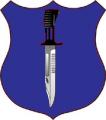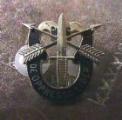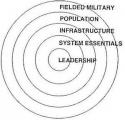...but that's not my point. War requires all forms of power, as war is political in nature. Even Neolithic, or wars between African/Native American tribes conforms to this norm.
Warfare (as opposed to war) is the domain of the military. There is no such thing as "Economic Warfare." There is merely the use of economic means to reduce the enemies capacity to conduct violence. That only becomes Warfare when you use military forces to execute it.
Sorry to sound pedantic or semantic, but words - Bob said - are important.








 ). When I model stocks I can less precisely discuss the effects of average costs, book value, currency fluctuations, dividends, upon price forecasts for specific stocks. We do not have this mathematical edifice for warfare and thus descriptions are much less precise.
). When I model stocks I can less precisely discuss the effects of average costs, book value, currency fluctuations, dividends, upon price forecasts for specific stocks. We do not have this mathematical edifice for warfare and thus descriptions are much less precise.





Bookmarks